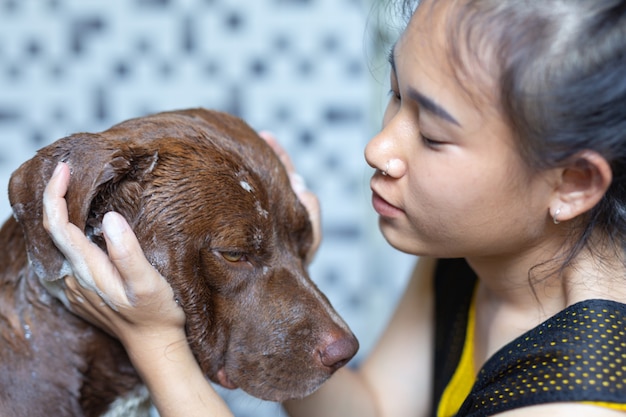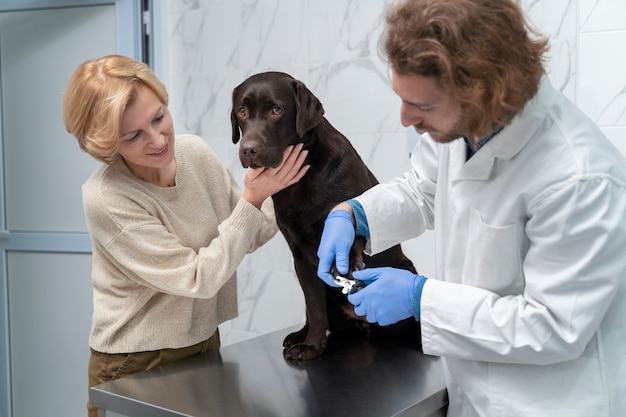Managing Pet Cancer Care During Humid Coral Springs Octobers


Managing Pet Cancer Care During Humid Coral Springs Octobers
Caring for a pet diagnosed with cancer is a journey that brings unique challenges, especially when living in a climate like Coral Springs, Florida. October in our area is known for lingering humidity, bursts of rain, and fluctuating temperatures, all of which can influence your pet’s comfort and wellbeing—especially if they are undergoing cancer treatment. At Veterinary Cancer Health, our team of veterinary oncology specialists is dedicated to supporting your family with advanced pet cancer care in Coral Springs and surrounding communities. In this blog, we will guide you through essential strategies for managing cancer care for dogs and cats during humid, rainy months. From preventing infection and supporting daily comfort to monitoring activity safely, we want to help you feel confident in every step of your pet’s care. You will also learn what makes working with a specialty oncology vet near me so valuable for your pet’s unique health needs, and how our specialized services, such as comprehensive cancer diagnosis and staging for pets, are tailored to the challenges of our South Florida climate.
Whether you are seeking personalized treatment plans, monitoring ongoing therapy, or simply looking for guidance on navigating pet cancer care in Coral Springs during the wetter fall season, our veterinary team is here to provide the expertise and compassion you deserve.
Recognizing Cancer-Related Challenges in Humid Coral Springs Weather
The humid conditions of October in Coral Springs create an environment where certain symptoms and complications can become more pronounced in pets with cancer. As a pet owner, it is important to recognize the signs that your pet might be struggling with the climate or experiencing complications related to their diagnosis or treatment plan.
Common issues to watch for in humid months include increased lethargy, reduced appetite, or changes in breathing patterns. Pets with cancer may also be more susceptible to skin infections, particularly in areas where the skin is already irritated by tumors, surgery, or chemotherapy. You might notice that your dog or cat is more prone to skin redness, moist sores, or hot spots that develop quickly in damp conditions. Additionally, pets undergoing treatments such as chemotherapy or immunotherapy might experience weakened immune systems, making them more vulnerable to bacterial or fungal infections that thrive in warm, moist environments.
If your pet’s energy levels drop noticeably, if you observe swelling or discharge from surgical sites, or if they become unusually withdrawn, these may be warning signs that the weather is impacting their overall health. Monitoring for subtle changes in your pet’s habits—such as hiding more often, vocalizing discomfort, or licking at sores—can help you catch issues early. Understanding these signs is the first step toward providing your pet with the extra support needed to stay comfortable and safe throughout the humid season.
Why Humidity and Rainy Weather Affect Pet Cancer Comfort
Humidity and pet cancer comfort are closely connected, particularly for animals whose bodies are already under stress from their illness or its treatment. In Coral Springs, the persistent moisture in the air during October can exacerbate certain symptoms and complicate the healing process for pets with cancer.
One major reason is that high humidity can make it harder for pets to regulate their body temperature. Dogs and cats with cancer may have reduced activity levels, and their ability to pant or sweat through their paws might be compromised, especially if they are feeling unwell. This can lead to overheating or increased discomfort, especially during outdoor walks or even when resting indoors if the air is damp and warm.
Another concern is the increased risk of skin infections and delayed wound healing. The combination of moist skin, compromised immune function, and potential side effects from chemotherapy or targeted therapies means that even minor skin irritations can quickly escalate. Fungal and bacterial organisms thrive in warm, damp environments, so any breaks in the skin—whether from surgical incisions, tumors, or scratching—require extra vigilance.
Additionally, the rainy season often leads to more indoor confinement, which can affect your pet’s mental health. Pets undergoing cancer treatment may already feel less inclined to play or exercise, and being cooped up indoors during storms can increase feelings of stress or anxiety. Understanding these climate-specific factors allows you and your oncology veterinarian to tailor your pet’s care plan to address both the physical and emotional aspects of their wellbeing during this time of year.
Advanced Cancer Treatments and Management Strategies from Your Oncology Veterinarian Near Me
At Veterinary Cancer Health, we recognize the importance of adapting cancer management to both your pet’s medical needs and the realities of life in Coral Springs. Our approach to pet cancer care in Coral Springs is rooted in advanced diagnostics, individualized therapy plans, and ongoing monitoring to ensure your pet’s comfort through every season.
Diagnostic and Monitoring Solutions
We begin with thorough cancer diagnosis and staging, using tools such as ultrasound, digital radiographs, CT scans, and molecular analysis to understand the full extent of your pet’s condition. These assessments help us design a treatment plan that considers both the cancer type and your pet’s overall health, which is especially important when factoring in the potential additional stressors posed by humidity and local climate. For more information on our diagnostic services, you can explore comprehensive cancer diagnosis and staging for pets.
Personalized Cancer Therapies for Coral Springs Pets
Treatment approaches involve options such as chemotherapy, targeted therapy, immunotherapy, and electrochemotherapy, each tailored to the specific cancer diagnosis and your pet’s individual response. During the humid months, our veterinary professionals closely monitor for any side effects that might be exacerbated by the weather. Adjustments to chemotherapy dosage, supportive medications, or the frequency of recheck exams can be made to address issues such as skin irritation, lethargy, or increased infection risk.
Ongoing cancer care and monitoring are essential, especially for pets managing chronic conditions or receiving maintenance therapy. Our veterinary oncology team uses regular bloodwork and physical examinations to track your pet’s progress, quickly identifying any emerging complications. You can learn more about our ongoing approach to pet cancer care and monitoring by visiting our page on ongoing cancer care and monitoring services for pets.
Support for Comfort and Quality of Life
For pets experiencing more advanced disease or those needing additional comfort, we also provide palliative and end-of-life care. This includes pain management, guidance on keeping your pet comfortable at home, and compassionate support for families making difficult decisions. Our focus is always on maintaining the highest possible quality of life, regardless of weather or seasonal changes.
Preventing Complications and Supporting Comfort at Home
Pet owners play a vital role in supporting the success of their pet’s cancer treatment and in preventing weather-related complications during humid Coral Springs Octobers. There are several practical steps you can take at home to safeguard your pet’s comfort and health.
First, monitor your home’s humidity levels using a dehumidifier or air conditioning. Keeping indoor humidity in check helps reduce the risk of skin infections and supports easier breathing for pets with respiratory or cardiac compromise. Regularly inspect your pet’s skin, especially in areas affected by cancer or recent surgery, for signs of redness, swelling, or discharge. Clean any affected areas gently and consult your oncology vet near me promptly if you notice concerning changes.
Maintaining good hygiene is crucial. Bathe your pet only as recommended by your oncology team, using gentle, hypoallergenic shampoos. Dry your pet thoroughly after baths or outdoor walks in the rain to prevent the skin from staying damp. Limiting time outside during the muggiest parts of the day can also help; early morning or late evening walks are often more comfortable for pets with cancer.
Nutrition and hydration are equally important. Dogs and cats undergoing cancer treatment may experience changes in appetite or taste, especially if receiving chemotherapy. Offer fresh water at all times and consult your veterinary oncology team about dietary adjustments that support immune health and energy levels. Encouraging gentle play or mental stimulation indoors during rainy days can help prevent boredom and reduce anxiety.
Finally, stay in close communication with your veterinary cancer care team. Regular recheck appointments, either in-clinic or through telemedicine when appropriate, allow for timely adjustments to your pet’s treatment plan as weather conditions or symptoms change.
When to Contact Your Oncology Vet Near Me for Immediate Support
While home care is invaluable, it is essential to know when to seek professional help from a specialist vet near me. Some situations require prompt intervention to prevent more serious complications.
Contact your veterinary oncology team if you observe persistent vomiting or diarrhea, severe lethargy, rapid breathing, or pain that does not resolve with prescribed medications. Signs of infection—such as swelling, oozing, or foul odor from a surgical or tumor site—should always be addressed as soon as possible, especially in humid weather when infections can progress rapidly.
Difficulty breathing, sudden collapse, or uncontrolled bleeding are medical emergencies and require immediate attention. If you are ever uncertain whether a symptom is serious, it is always better to err on the side of caution and reach out for guidance. Our veterinary professionals are available to provide second opinions and case reviews, offering an extra layer of reassurance as you navigate your pet’s cancer journey. For those seeking a second look at a complex case, you can find more information about our second opinions and veterinary case reviews for pet cancer.
Remember, managing pet cancer care in Coral Springs is a collaborative process between you and your veterinary oncology team, and timely communication is key to achieving the best possible outcomes.
Conclusion: Compassionate Pet Cancer Care in Coral Springs—Here When You Need a Specialist Vet Near Me
Navigating pet cancer care in Coral Springs during the humid, rainy days of October can feel overwhelming, but you do not have to do it alone. At Veterinary Cancer Health, our focus is always on providing advanced, compassionate cancer care that adapts to the unique needs of your pet and your family—no matter the season. From state-of-the-art diagnostics and personalized treatment plans to ongoing monitoring and supportive home care strategies, our team of oncology veterinarians is here to ensure your pet’s comfort and safety every step of the way.
If you have questions about pet cancer care Coral Springs or want to learn more about how humidity and pet cancer comfort are managed in our climate, we encourage you to contact our veterinary professionals for expert guidance. You can schedule a consultation or request a recheck exam by calling (195) 459-28504, or visit us in person at 4101 Turtle Creek Drive, Coral Springs, FL 33067. Whether you are searching for an oncology veterinarian near me or seeking ongoing cancer care and monitoring in Coral Springs, our veterinary oncology team is here to support your pet’s health and your peace of mind.
For more insights into managing cancer therapy at home, or to explore our ongoing cancer care and monitoring services for pets, reach out to us today. Let us help you provide the comfort and expert care your pet deserves, no matter what October weather brings.
This blog is for informational purposes only and should not replace professional veterinary advice. Always consult your veterinary oncologist for specific recommendations regarding your pet’s health and treatment plan.

.png)
















